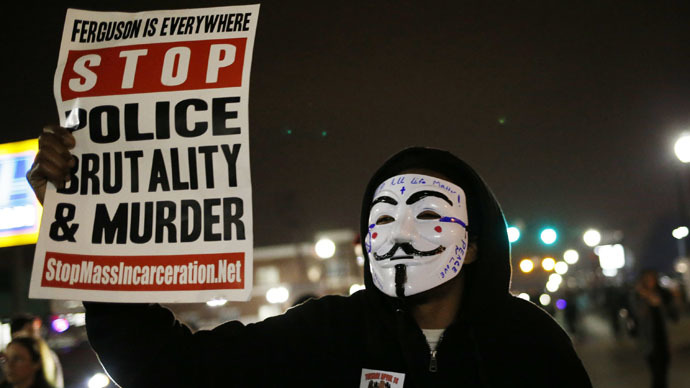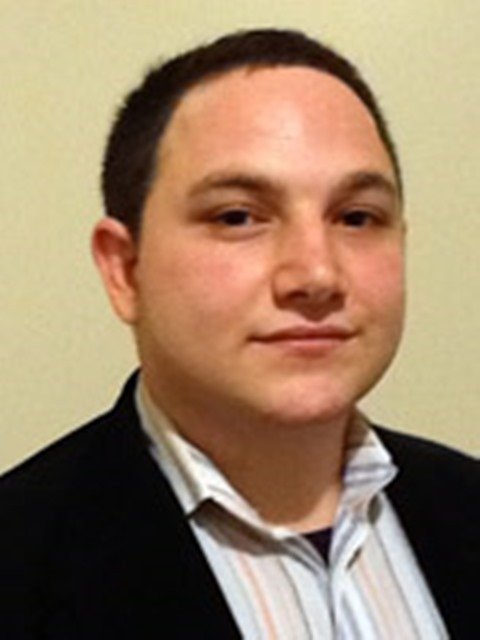'Ferguson protests: lack of justice at the very fabric of US society'

The lack of civil rights, the lack of equality, the ‘ghettoization’, the institutionalization of racism are fundamental and making what is called ‘America in the 21st century’, Eric Draitser, geopolitical analyst, told RT.
RT:What impact could this shooting have on police reforms that were supposed to take place in Ferguson?
READ MORE: 2 cops shot at rally near police station in Ferguson
Eric Draitser: It’s going to have a significant impact on everything that is happening in Ferguson. I think first and foremost we should begin with the impact that it’s going to have on the on-going protest movement, on the ongoing calls for justice, and it is not simply reform of the Ferguson Police Department, but calling attention to the institutionalized racism that exists both within that institution as well as within the larger institutions in Missouri and in the US. Of course this will delegitimize those protests, it will delegitimize that movement or at least that is the attempt that is going to be made. We have a very clear precedent here in New York City in the aftermath of the non-indictment of the killers of Eric Garner. When we had a massive protest movement developing in New York, you had a very similar incident in which two police officers were attacked and that incident was then used to attack the protesters, that is to say to attack them in the media, attack them in public relations, and we can expect a very similar outcome here. It’s very unfortunate because of all of the information that has come out about the racism, about the brutality and the other impacts that it was having in Ferguson itself.
RT:The recent wave of resignations in the wake of the Michael Brown shooting was supposed to ease tensions. Does it look like they've had the reverse effect?
ED: They were certainly meant to present the illusion of changes, cosmetic changes, but again, I don’t think that anything was really addressing the criminal nature of the police department there. And certainly it is not easing tensions. We should come back to the facts in this case. We have corroborated accounts, that is to say corroborated by multiple eye-witnesses that the shots that were fired - which the mainstream media is attempting to allege came from the protesters - actually came from some distance behind them.
The question then becomes exactly who is benefitting from this, and who might have perpetrated such an attack, naturally an investigation is what is really called for. But the larger question is: does anybody really expect justice and fairness from the Ferguson Police Department as if they would be the once investigating this incident. What might need to be called for a some kind of a special investigation possibly even a special prosecutor, special investigator, something along those lines, because the reality is, the situation in Ferguson is a volatile one and it … really addresses many of the most fundamental questions in the US regarding racism, social justice, institutionalization of the brutality, militarization of police. All of these issues that many of us have been talking for quite a long time; all of them come to the fore in the recent developments.
READ MORE: ‘This is really an ambush’ – St. Louis police chief on Ferguson shooting
RT:Let's have a look at some law enforcement statistics from the last couple of years... According to the Justice Department, over 90 percent of all those arrested in Ferguson were black. And in many districts of the country, the rate is even higher. How serious a problem is this, and what's the cause of it?
ED: It is one of the most serious social justice problems that we face in this country. It’s difficult to encapsulate such a large and long-standing problem here in a few minutes. But at a basic level this comes down to social inequality. The lack of justice is at the very fabric of American society. Certainly we could trace the sociological phenomenon to the roots of the African slave trade and the African-American experience in this country. More recently we could trace it specifically to the lack of civil rights, the lack of equality, the ‘ghettoization’, the institutionalization of racism. All of these elements are really fundamental and making what we call “America” in the 21st century.
Part of the reason why Ferguson became such a flashpoint, why New York City became such a flashpoint is not simply the deaths of Mike Brown and Eric Garner, tragic though they were; it is the way in which they symbolize the larger question of a lack of social justice in this country. Precisely the motivation for those protestors in New York, for the protesters in Oakland, for protesters in Ferguson - all of these goes to this broader question of justice. And it is justice that the protesters have been seeking and calling for from the very beginning precisely the justice that’s denied the family of Mike Brown, the family of Eric Garner, the families of hundreds of others, primarily people of color, but not exclusively the people of color, who have been victimized and murdered by the police.
RT:Do you see any way out of this situation? How can police rebuild trust with local communities?
ED: It is a multifaceted issue. I think first and foremost there needs to be a serious investigation conducted by independent investigators of the Ferguson Police Department, of the political establishment that has been backing them, that has been shielding them from public scrutiny. There also needs to be held to account all of the elected officials in this country, not only Republicans, but also Democrats. All of them who really run interference for precisely this sort of inequality, all of those including President Obama himself who parade around on the corporate media and talk about “One America”, talk about unifying the country. And all of these other vague and vacuous platitudes, all of these needs to be pushed to the side and we need to address the fundamental questions that are at the root of this country, and at the root of the problems. Unfortunately, from my perspective you’re not going to solve this in a top down fashion, there needs to be social vibrant social movements that refuses to be suppressed by the media and by the police. Those social movements need to continue doing what they have been doing, they need to grow, and they need to be supported by all people of goodwill: white, black, Asian, Latino. All of us have a stake in building social justice, and building a better country. Those who oppose that movement need to be exposed for what they are.
The statements, views and opinions expressed in this column are solely those of the author and do not necessarily represent those of RT.
The statements, views and opinions expressed in this column are solely those of the author and do not necessarily represent those of RT.













